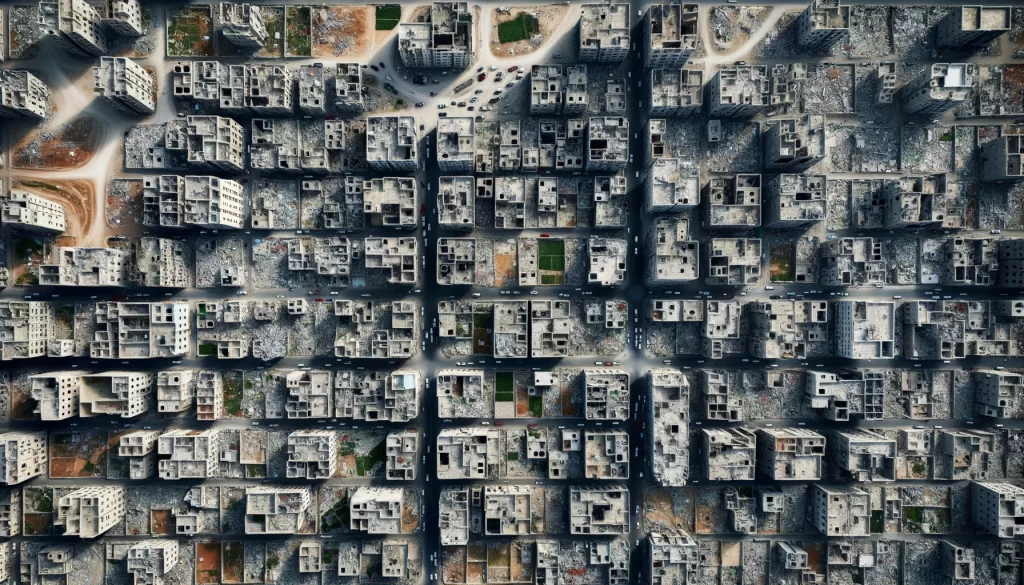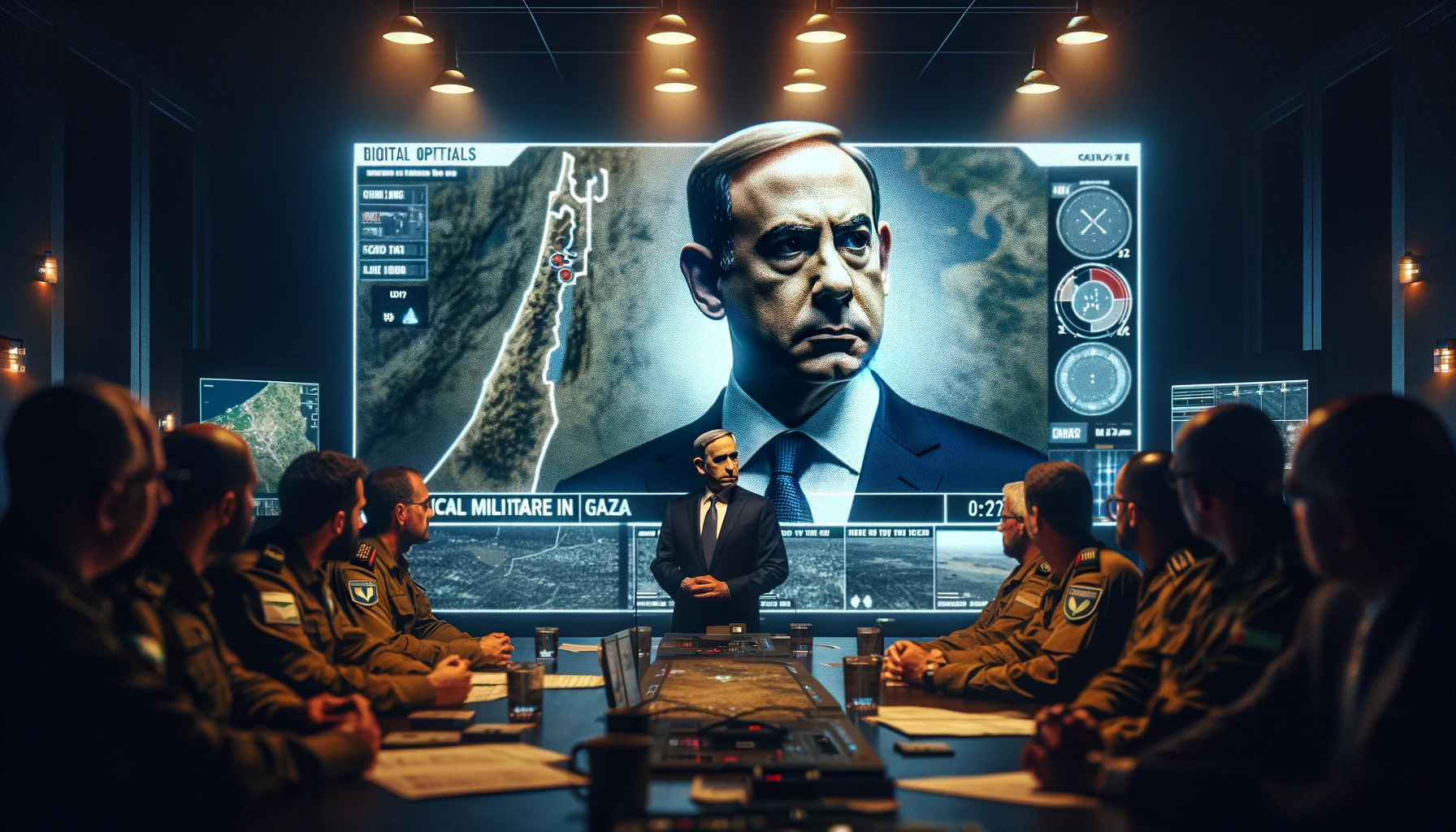Benjamin Netanyahu, the Prime Minister of Israel, is often seen as someone who delays making big decisions. However, he might not have the luxury to do so for much longer.
In Israel, Netanyahu’s government partners, who are considered far-right, have threatened to leave the government if he agrees to a ceasefire without addressing the presence of Hamas in Rafah, a city in southern Gaza.
From a military standpoint, the goal is to dismantle Hamas by taking control of Rafah and the border with Egypt. On the diplomatic front, though, Netanyahu’s international allies, particularly the United States, are urging him to consider a ceasefire, avoiding an assault on Rafah which could lead to civilian casualties.
Currently, Netanyahu is handling multiple issues at once, which are crucial both to the ongoing conflict and his future as Prime Minister.
He has recently instructed Palestinians in certain parts of Rafah to relocate to safer areas designated by Israel. This was followed by the Israeli military taking control of the Gazan side of the Egyptian border. These actions indicate Netanyahu’s commitment to prioritize Israel’s security, supported by Israel’s war cabinet, including key opposition leaders.
The capture of the border crossing at Rafah has, for now, prevented a large-scale military operation in Rafah, which is crowded with displaced civilians. This move suggests that Israel might finally be leaning towards a temporary ceasefire in Gaza, though the outcome of these talks is still uncertain.
“Netanyahu is being pulled in various directions,” noted Daniel C. Kurtzer, a former U.S. ambassador to Israel now at Princeton. He is primarily concerned with avoiding new elections, which could result in him losing power and facing renewed legal challenges. “Political survival always ranks first in Netanyahu’s calculations,” Kurtzer explained.
Netanyahu also faces pressure from extremists within his coalition who prefer continuing the conflict, and from families of hostages who urge the government to focus on securing a ceasefire and releasing people captured during attacks by Hamas on October 7.
Additionally, some U.S. officials and members of Congress are growing impatient with the humanitarian situation and are pushing for a ceasefire. They oppose a major military operation in Rafah. Moreover, the ongoing threat of escalation from groups like Hezbollah is a serious concern.
As Netanyahu navigates these complex political, military, and diplomatic issues, he must carefully consider his next steps.

Political Arena
Netanyahu’s coalition holds a slight majority in the Knesset, Israel’s Parliament, with 64 seats out of 120. His far-right partners, Itamar Ben-Gvir and Bezalel Smotrich, who control 14 seats, have declared they will exit the government if Netanyahu agrees to a ceasefire in Gaza, which might be seen as a victory for Hamas. They demand that military actions continue in Rafah.
Gadi Eisenkot, a former general and member of the opposition in the war cabinet, has accused these two politicians of “political blackmail” and obstructing efforts to return at least some hostages.
However, should new elections occur, it is likely that Netanyahu could form a new government without Ben-Gvir and Smotrich, giving him more flexibility.
In the ongoing negotiations, Netanyahu is considering a temporary ceasefire that would unfold in stages. This would allow a slower, more controlled approach to addressing the Hamas presence in Rafah, now that Israel controls the border area along Egypt. This strategy would also facilitate the return of more hostages, easing the pressure from public protests led by their families.
Such a ceasefire would also serve President Biden’s interests, presenting a diplomatic win and enabling a significant increase in humanitarian aid to Gaza. It would allow more civilians to move to safer areas and help avoid a direct assault on Rafah.
“Netanyahu is in no hurry to end the war,” stated Daniel Levy, a former Israeli negotiator. He believes that Netanyahu prefers to prolong the conflict to maintain his coalition and avoid elections, using the ongoing war as a reason to delay political challenges.
Military Perspective
In the ongoing conflict, Israeli military experts highlight the importance of halting the smuggling of weapons and supplies from Egypt into Gaza through tunnels beneath Rafah. This strategy is seen as crucial, possibly even more than combating the remaining Hamas fighters in the area.
Despite claims from Egypt that smuggling isn’t significant, Israeli leaders believe that the large stockpile of weapons and building materials Hamas has gathered in Gaza mainly entered through these underground routes.
Kobi Michael from the Institute for National Security Studies in Tel Aviv points out, “If we conclude the war without sealing these tunnels, it would allow Hamas or any other group in Gaza to regain their military strength.”
Nitzan Nuriel, a former director at the Israeli National Security Council and reserve brigadier general, worked closely with Netanyahu. He explains that controlling Rafah sends a strong message to Gaza’s residents that Hamas won’t permanently govern Gaza, which might decrease local support for Hamas out of fear.

According to Natan Sachs from the Brookings Institution, even a limited military action in Rafah would align with several of Netanyahu’s objectives. He asserts that Netanyahu truly believes that an operation in Rafah is vital for Israel’s broader goals, including disrupting Hamas’s supply lines from Egypt.
Such military actions could also influence Hamas to moderate their demands in the ceasefire discussions, Sachs notes.
Despite American reservations, Sachs believes that a targeted operation in Rafah currently aligns with Netanyahu’s political needs, especially given the domestic pressure from his right-leaning political allies and public dissatisfaction with the enduring presence of Hamas, despite it being weakened.
Diplomatic Challenges
On the diplomatic front, Mr. Netanyahu faces significant international pressure—from allies like the USA and Germany, bodies like the United Nations and the European Union, and regional Arab nations—to avoid a major military campaign in Rafah.
These international actors urge Israel to allow more humanitarian aid into Gaza and to negotiate a ceasefire that could lead to what they term a “sustainable calm,” though not necessarily a permanent ceasefire.
Yet, such agreements would not settle the deep-rooted conflict between Israel and Hamas. Hamas is demanding an immediate end to the war, including the withdrawal of Israeli troops from Gaza and the release of all hostages in exchange for numerous Palestinians imprisoned in Israel.
Israel, however, seeks a temporary ceasefire to prevent Hamas from declaring victory and regaining control over Gaza.
Despite these complexities, the recent concessions by Hamas, combined with Israeli military efforts to secure the Egyptian border, suggest that a ceasefire agreement might now be within reach, potentially benefiting Netanyahu.
However, Gazans remain skeptical of Israeli assurances. Mkhaimar Abusada, a political scientist from Gaza currently in Cairo, expresses doubt about Israel’s intentions. He believes Netanyahu will likely proceed with operations in Rafah to maintain his government and avoid potential legal challenges. He hopes any actions taken will consider the humanitarian needs of Palestinian civilians.
Abusada predicts that there will be no clear winner from this conflict, saying Netanyahu “and Israel cannot be victorious after this war, not with this much death and destruction, with all the Palestinian civilians and children dead.”
This article is based on the following article:

Background Information
This background should provide readers with a clearer understanding of the intricate and multifaceted nature of the issues discussed in the article.
1. Who is Benjamin Netanyahu?
Benjamin Netanyahu is a prominent Israeli politician who has served as the Prime Minister of Israel for multiple terms, making him one of the longest-serving prime ministers in the history of Israel. His political stance is generally right-wing, and he is a member of the Likud party, which is conservative.
2. What is Hamas?
Hamas is a Palestinian Islamist political organization and militant group that has controlled the Gaza Strip since 2007. Hamas is known for its opposition to Israel and has been involved in numerous conflicts with Israel over the years. It is designated as a terrorist organization by several countries, including Israel and the United States, though it also provides social services and governs Gaza.
3. The Gaza Strip
The Gaza Strip is a small region on the eastern coast of the Mediterranean Sea that borders Egypt on the southwest and Israel on the east and north. It is densely populated and has been under various forms of control and blockade since the mid-20th century, currently by Israel and Egypt. The territory is the site of frequent conflicts due to the long-standing Israeli-Palestinian conflict.
4. Israeli-Palestinian Conflict
This is a long-running conflict between Israelis and Palestinians, mainly revolving around issues like land rights, the recognition of national identities, and control of sacred sites. Key events in this conflict include the 1948 establishment of Israel, multiple wars, two Palestinian uprisings (intifadas), and ongoing disputes over Israeli settlements and Palestinian statehood.
5. Ceasefire Concept
A ceasefire in the context of Israeli-Palestinian relations refers to an agreement to stop fighting temporarily. Ceasefires can be partial or total and often serve as a preliminary step towards more comprehensive peace talks. However, ceasefires have often been fragile and can be broken by either side.
6. Role of International Community
Countries like the United States and Germany, organizations like the United Nations and the European Union, and regional Arab states often play roles in mediating conflicts in the Middle East, including pushing for ceasefires, providing humanitarian aid, and attempting to negotiate long-term peace agreements.
7. Humanitarian Issues
In conflict zones like Gaza, civilian populations often face severe hardships, including shortages of food, water, medical care, and shelter. International law and humanitarian principles call for the protection of civilians, and aid organizations frequently seek to deliver humanitarian assistance to those in need.
8. Political Implications in Israel
Israeli politics can be highly complex and is significantly influenced by security issues. Leaders like Netanyahu often have to balance domestic political considerations, such as maintaining coalition governments, with international pressure and military strategy.
Please subscribe to Insight Fortnight, our biweekly newsletter!
